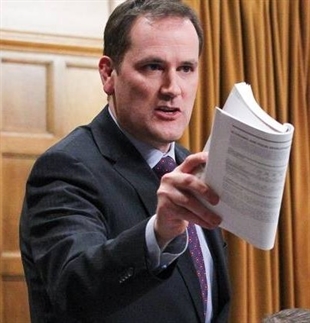
Dan Albas a Member of Parliament.
Image Credit: SUBMITTED/Dan Albas
April 21, 2019 - 12:00 PM
OPINION
On April 1st in British Columbia, the carbon tax rate was increased from $35 tonne to $40 tonne.
This translates to an increase on the carbon tax you pay on your gas home heating bills as well as when you fuel up your vehicle.
As a result I am increasingly hearing complaints from citizens over higher gas bills and the price at the pumps.
One recent question I received was how much higher the carbon tax increases will go.
When Prime Minister Trudeau called for a Pan Canadian agreement on pricing carbon pollution in Canada, it mandated
a carbon tax rate of $50 per tonne in 2022.
So, April 1st of each year, BC's carbon tax rate will increase until it hits $50 per tonne, currently forecast for April 1, of 2021.
In terms of revenue, the BC NDP 2019 provincial budget over the next three fiscal years reveals that the carbon tax is forecast to generate $1.7, $1.97 and $2.2 billion.
That is close to $6 billion of carbon tax revenue collected over the next three years.
There has also been some confusion as the federal government imposed a national carbon tax on provinces that did not agree to the Pan-Canadian carbon pricing agreement.
In those provinces, Saskatchewan, Manitoba, Ontario and New Brunswick, the Trudeau Government has indicated the intention is to ensure the national carbon tax is revenue neutral to citizens, although there is some debate on the veracity of those claims.
Is the carbon tax revenue neutral here in BC?
While BC's carbon tax will generate close to $6 billion in tax revenue over the next three years, the climate action tax rebate, intended to offset those costs to lower income citizens over the same period, is forecast to return just $928 million.
“Clean BC”, another climate relate provincial program, has a total spending forecast of $679 million over the same three year time frame.
Therefore, in order to meet Mr. Trudeau’s $50 per tonne carbon tax target, BC citizens will pay close to $6 billion in new carbon tax over the next three years.
Despite collecting $6 billion carbon tax revenue, only roughly $1.6 billion is being returned in various programs related to climate change.
That means, in BC , the carbon tax is not revenue neutral.
I mention this as many citizens are confused when they hear the federal government suggest the carbon tax is revenue neutral when that is not what is being experienced here in B.C.
It is also important to be aware that while the federal government has dictated the $50 per tonne carbon tax increase, in BC, it is the decision of the current NDP provincial government if the carbon tax is revenue neutral or not.
My question this week:
Do you support the carbon tax increasing to $50 per tonne by 2021/22?
I can be reached at Dan.Albas@parl.gc.ca or call toll free 1-800-665-8711.
We welcome your comments and opinions on our stories but play nice. We won’t censor or delete comments unless they contain off-topic statements or links, unnecessary vulgarity, false facts, spam or obviously fake profiles. If you have any concerns about what you see in comments, email the editor.
News from © iNFOnews, 2019